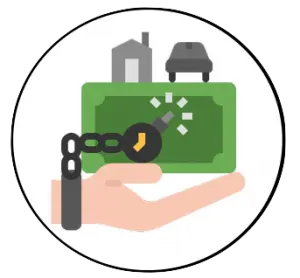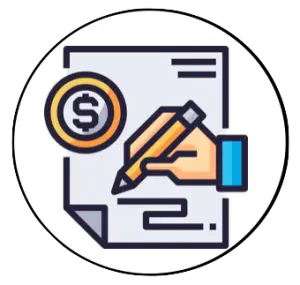CHAPTER 7 BANKRUPTCY
PHOENIX CHAPTER 7 BANKRUPTCY
Filing Chapter 7 bankruptcy in Phoenix, Arizona is part of the federal bankruptcy law. Plus, filing a Chapter 7 bankruptcy and having it discharged will let you get rid of many financial obligations. Additionally, all of your unsecured debts including Medical Debt and Credit Card Debt will be discharged in the bankruptcy filing. Without debts and regular monthly payments, you should quickly be on the road to a “Fresh Start.” Call our Chapter 7 bankruptcy attorney today.
One of the biggest benefits of a Chapter 7 bankruptcy is that you are allowed to keep your personal property while alleviating debt. Additionally, a Chapter 7 bankruptcy stops creditors. Also, ch 7 stops other debt collection personnel from hounding you with collection calls. Even if you have judgements, bank levies, or garnishments; collection efforts legally have to stop once you file for chapter 7 protection in Maricopa County, Phoenix, Arizona. Get debt free today with a Phoenix chapter 7 bankruptcy.
File Chapter 7 with $0 Down
Stop A Wage Garnishment
Benefits of Chapter 7 Bankruptcy

Chapter 7 Zero Down Bankruptcy
When you file Chapter 7 bankruptcy your obligations to pay back qualified debts. Those debts are completely wiped away. Therefore, it is easy for you to become debt free. Plus, our Arizona bankruptcy attorneys offer these filings with “No Money Down”. Our $0 filing fees make this an affordable debt relief option in Arizona.

Stop Wage Garnishment with Chapter 7
If you’re ready to stop a wage garnishment, bank levy, or avoid the repossession of your vehicle, then you may want to consider Chapter 7 bankruptcy. Our Arizona bankruptcy attorneys offer Chapter 7 filings with “No Money Down”. Facing a wage garnishment calls for debt relief action. Call our Arizona Debt Attorneys today.

Debt relief through Ch. 7 bankruptcy
Chapter 7 Bankruptcy in Arizona can have major positive impacts on your life. Chapter 7 bankruptcy benefits including: offering immediate relief from harassing debt collectors, erasing most of your bills and debts, improving your credit score, saving your home from a foreclosure, and preventing wage garnishment.
CHAPTER 7 BANKRUPTCY FREQUENTLY ASKED QUESTIONS
The first factor that determines if you can file for a Chapter 7 is your income. The first method of income qualification is by making less than the median for your state and family size. If you are married, your spouse’s income will count in the calculations. Only minor children will be counted towards your family size.
If you don’t make less than your state’s median, you will need to pass the Means Test to qualify for a Chapter 7. The Means Test averages the last six months of your income. Then, mandatory monthly expenses will be deducted from your averaged income. The remaining number will need to be at or below a certain amount depending on your state and family size to qualify for a Chapter 7.
When filing Chapter 7, your assets will need to fall under your state’s exemptions or they will be sold towards the bankruptcy estate. Your home, car, furniture, clothes, and wedding ring are typically covered by these exemptions. Some states even have a wildcard exemption that can be used on a miscellaneous asset. These exemptions aren’t typically very high, so if your assets are worth more than the exemption, you may want to consider Chapter 13 to avoid surrendering the asset.
Chapter 7 is a great tool to help you if you’re struggling with debt, but it can’t be used too frequently. You must wait 8 years between filing Chapter 7. If you have previously used Chapter 13 bankruptcy, you will need to wait 6 years from the filing date before you can file a Chapter 7.
If you have decided that the benefits outweigh the costs of bankruptcy, or have more questions, call our office to schedule a free consultation. We offer them telephonically and can sometimes even schedule appointments same-day. Take the first step towards a financial clean slate and get started today!
STEPS TO FILING CHAPTER 7 BANKRUPTCY IN ARIZONA
1. Consult with an Arizona Bankruptcy Attorney
Even if you decide to file pro se, or without an attorney, a consultation with an experienced bankruptcy attorney should be your first step to filing a bankruptcy in Arizona. The attorney should help you figure out which chapters you qualify for and any potential issues in your case. If you do choose to retain the attorney, they will provide you with a list of documents necessary to draft your petition. Many Arizona Debt relief Attorneys offer Free Consultations
2. Gather and Submit your Documents
Your next step will be assembling your documents for your attorney (or for yourself if you are filing pro se). Documents typically needed include two years of tax returns, six months of paystubs, registrations to vehicles, any divorce or child support documents from the past six years. Additionally, you will need discharge paperwork from any prior bankruptcies, and bank statements. Plus, you will also need to submit bills for debts that you’d like to be discharged. Be aware that submitting your documents doesn’t mean your bankruptcy is filed– your bankruptcy attorney will need some time to draft your petition once receiving all of your documents.
3. Take your First Credit Counseling Course
4. Review and Sign your Petition with your Attorney
After you have completed your first course, you and your attorney will go over your petition to make sure there are no mistakes or updates to add. Your wet signature will also be required on the Declaration of Electronic Filing. If there isn’t anything to fix on the petition, your attorney will file the petition during or shortly after your petition signing. They will also likely take the chance to prepare you for your 341 Hearing.
5. Attend your 341 Meeting of Creditors
You should receive a letter from your trustee after your petition is filed. The trustee will provide you with your court date, and likely request additional documents. You should provide those documents to your trustee as soon as possible, or bring them to the 341 Hearing if you are unable to provide them sooner. Your 341 Meeting of Creditors will usually be held approximately 30-45 days after you file. Attending your 341 Meeting of Creditors is absolutely necessary, whether or not you have an attorney. Your case may be continued if you fail to attend, but it may be dismissed if you miss too many hearings. The trustee will have questions about your petition, along with any creditors who choose to attend.
6. Take your Second Credit Counseling Course
You must take a second credit counseling course within 60 days of your 341 Meeting of Creditors. Once this step, along with all of the steps listed above, is completed, you will just be waiting for your case to be discharged. Your creditors will have 60 days after your 341 Hearing to object to your debts being discharged if they were unable to attend the hearing. Your case may not be discharged exactly on the 60th day- it may be a few days or even weeks before the court completes the necessary paperwork.
While Chapter 7 can be boiled down to six simple steps, it is usually more complicated than that in practice. If you have further questions about Chapter 7 or any other chapter of bankruptcy, our office is here to help. We offer free consultations to help you get started towards a financial clean slate 100% risk-free. The only way to get started is to call, so schedule your consultation today!
PHONE
602-609-7000
HOURS:
Monday-Thursday 8:00 AM – 7:00 PM
Friday: 8:00 AM – 6:00 PM
Evening and Weekend hours available by appointment
EMAIL
[email protected]




